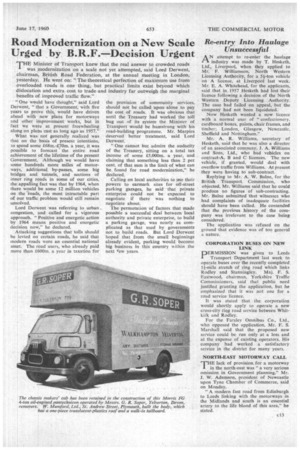Road Modernization on a New Seale Urged by B.R.F.—Decision Urgent
Page 49

If you've noticed an error in this article please click here to report it so we can fix it.
THE Minister of Transport knew that the real answer to crowded roads
was modernization on a scale not yet attempted, said Lord Derwent, chairman, British Road Federation, at the annual meeting in London, yesterday. He went on: " The theoretical perfection of maximum use from overloaded roads is one thing, but practical limits exist beyond which dislocation and extra cost to trade and industry far outweigh the marginal benefits of improved traffic flow."
"One would have thought," said Lord Derwent, "that a Government, with five years to prove this, would have driven ahead with new plans for motorways and other improvement works, but in fact we were at present freewheeling along on plans cast as long ago as 1957."
What was not generally realized was that on the basis of present intentions, to spend some £68m.-£70m. a year, it was possible to forecast the entire road achievement of the lifetime of the present Government. Although we would have some hundreds more miles of motorways, additional by-passes, some big bridges and tunnels, and sections of inner ring roads in some of our cities, the appalling fact was that by 1964, when there would be some 12 million vehicles on the roads, the most intractable part of our traffic problem would still remain unsolved.
Lord Derwent was referring to urban congestion, and called for a vigorous approach. "Positive and energetic action by 1964 means positive and energetic decision now," he declared.
Attacking suggestions that tolls should be levied on certain roads, he said that modern roads were an essential national asset. The road users, who already paid more than £600m. a year in taxation for
the provision. of community services, should not be called upon alone to pay the cost of roads, It was obvious that until the Treasury had worked the toll bug out of its system the Minister of Transport would be hamstrung with his road-building programme. Mr. Marplei deserved better treatment, said Lord Derwent.
"One cannot but admire the audacity of the Treasury, sitting on a total tax income of some £5,000m. a year, and claiming that something less than 2 per cent. of that sum is the limit of what can be found for road modernization," be declared.
Calling on local authorities to use their powers to earmark sites for off-street parking garages, he said that private enterprise could not be expected to negotiate if there was nothing to negotiate about.
The permutation of factors that made possible a successful deal between local authority and private enterprise, to build a parking garage, was nearly as complicated as that used by governments not to build roads. But Lord Derwent hoped that from the small beginnings already evident, parking would become big business in this country within the next few years.
























































































































